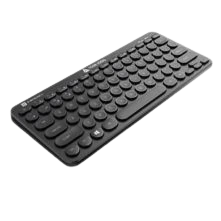Get A Quote
BIS Certification for Wireless Keyboard IS 13252 (Part 1): 2010

Wireless keyboards have revolutionized the way we interact with devices, offering flexibility, convenience, and enhanced productivity. However, ensuring their safety and performance is crucial, which is where BIS Registration for Wireless Keyboards comes into play. Governed under IS 13252 (Part 1): 2010, this certification ensures compliance with essential safety, quality, and electromagnetic compatibility standards, making it a mandatory requirement for manufacturers selling wireless keyboards in India.
What is BIS CRS Certification for Wireless Keyboards?
The BIS CRS certification for Wireless Keyboards is part of the Compulsory Registration Scheme (CRS), which mandates that all wireless keyboards must comply with the Indian Standard IS 13252 (Part 1): 2010 before being marketed in India. This certification is designed to protect consumers from potential electrical hazards, ensure high product performance, and maintain electromagnetic compatibility to prevent interference with other devices.
Why is CRS
Certification Necessary for Wireless Keyboards?
- Ensures Electrical Safety and Performance: Compliance with IS 13252 (Part 1): 2010 minimizes risks such as electrical shocks, short circuits, and overheating. This compliance guarantees reliable wireless connectivity, responsive typing, and extended battery life.
- Mandatory for Market Entry: In order to legally distribute their products in India, manufacturers must obtain BIS CRS certification for Wireless Keyboards. Compliance with these regulations fosters trust among consumers and regulatory bodies, thereby enhancing brand reputation.
- Prevents Electromagnetic Interference (EMI): Compliance ensures that the device does not interfere with other electronic products, promoting seamless operation. It also meets national and international standards for electromagnetic compatibility.
- Enhances Consumer Trust and Market Competitiveness: Certified products are preferred by retailers and consumers due to their assured safety and quality. This certification encourages innovation while ensuring adherence to industry regulations.
Overview of Indian Standard for Wireless Keyboards - IS 13252 (Part 1): 2010
The Indian Standard for Wireless Keyboards under IS 13252 (Part 1): 2010 outlines stringent requirements for electrical safety, durability, and electromagnetic compatibility. Compliance with these standards ensures that wireless keyboards function optimally without posing safety risks. Key aspects include:
Electrical Safety: Protection against electric shocks and insulation failures.
Electromagnetic Compatibility (EMC): Prevents interference with other wireless devices.
Performance & Durability: Ensures reliable key responsiveness, battery efficiency, and resistance to wear over time.
Thermal Safety: Confirms that the keyboard operates efficiently within a safe temperature range.
BIS Registration Process for Wireless Keyboard
The BIS registration process differs slightly for domestic and foreign manufacturers but broadly follows these steps:
For Foreign Manufacturers:
- Nominate an Indian Representative: A foreign manufacturer must appoint an Indian Representative with a valid business presence in India to handle the registration process.
- Online Application Submission: The representative submits an application via the BIS portal, ensuring all details are accurate.
- Sample Testing: Wireless Keyboard samples are tested in a BIS-approved laboratory for compliance with IS 13252(Part 1):2010.
- Submit Complete Application: The application, along with test reports and required documents, is submitted online or in hard copy.
- BIS Verification: The BIS reviews documents and may conduct factory inspections.
- Grant of License: Upon successful verification, the BIS grants a license, allowing the use of the CRS mark.
For Domestic Manufacturers:
- Submit Online Application: Domestic manufacturers directly apply on the BIS portal to begin the registration process.
- Sample Testing: Like foreign manufacturers, samples are tested at a BIS-recognized lab.
- Submit Application: A complete application, including test reports, is submitted to the BIS.
- Verification: The BIS reviews documents and may inspect the manufacturing facility.
- License Grant: After successful verification, the BIS issues a license for using the CRS mark.
Documents Required for BIS Certification
Below is a comprehensive checklist of documents needed for BIS registration:
General Documents:
● Filled CDF/CCL forms.
● BIS application form.
● Business License (original + English translation).
● Scope of Business License (original + English translation).
● ISO Certification of the manufacturing unit.
● Product marking label details.
Additional Documents for Foreign Manufacturers:
● Authorization letter (if the signatory isn’t the manufacturing head).
● Trademark certificate.
● Indian Representative's registration proof.
● Photo ID of the authorized representative.
Technical Documents:
● User manual or technical specification sheet.
● Test reports from BIS-approved laboratories.
Conclusion:
Securing BIS CRS certification for Wireless Keyboards is essential for manufacturers looking to sell high-quality, compliant products in India. By meeting IS 13252 (Part 1): 2010 requirements, manufacturers ensure their wireless keyboards are safe, efficient, and market-ready.
Navigating the certification process can be complex, but expert guidance from compliance specialists like EVTL India can streamline the journey. Our team assists manufacturers in document preparation, laboratory coordination, and application submission, ensuring a smooth and hassle-free certification process.
By partnering with EVTL India, manufacturers can confidently obtain BIS Registration for Wireless Keyboards, affix the BIS Standard Mark, and secure a competitive edge in the growing Indian electronics market. Get started today and ensure your wireless keyboards meet the highest safety and performance standards!
Free Call Back
Latest News & Update
🚀 Breaking News: New software update available for all users!
💡 Latest Feature: Introducing AI-powered automation tools.
📅 Upcoming Event: Join us for the webinar on September 30th.
🕒 Support Hours: Expanded customer support hours next week.
⚙️ Tech Tip: Learn how to maximize productivity with our latest tools.
Why Choose EVTL INDIA
Expertise in Indian Regulatory Standards
End-to-End Support
Trusted by Top Indian & Global Brands
Fast Processing & Transparent Pricing
Strong Liaison with Indian Authorities
Company Profile














